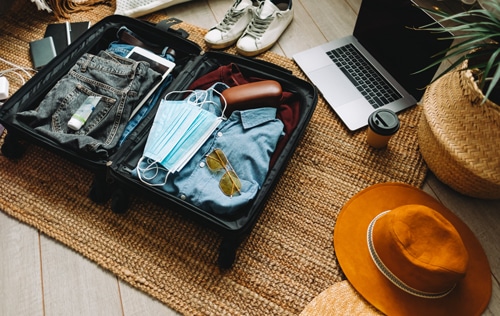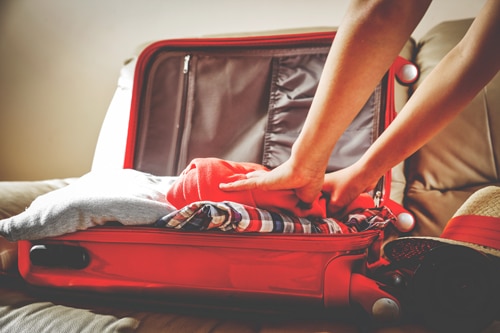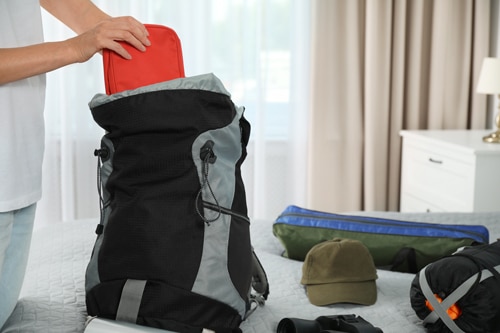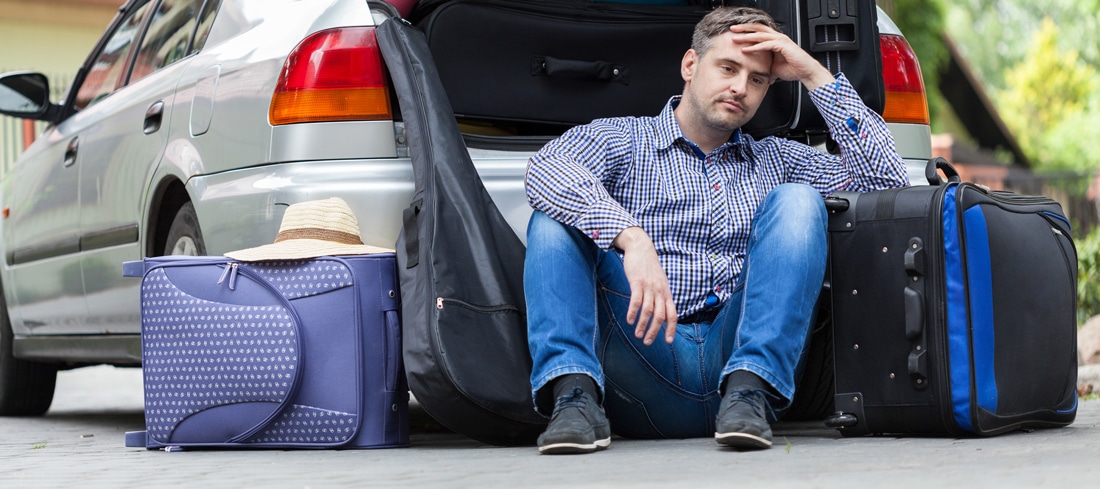Deciding to go commit to a drug or alcohol rehabilitation program is a life-changing commitment. Addiction treatment facilities such as Granite Mountain pride themselves in taking on difficult situations head-on and helping turn people’s lives around. Going to rehab can help get your life back on track, but it can also be an intimidating undertaking. Luckily, there are resources and help available to people who need access to it the most.
Stepping into a situation away from the comfort of your home, your friends, and your family can be daunting for anyone. It is important to know what you can and cannot take with you into your rehabilitation experience so that you can be provided with the safest and best care and the most comfortable situation.
This checklist is designed to remove the stress from the start of your rehabilitation experience. While it may vary slightly from facility to facility, this article is a good place to start to know what things you should bring to rehab and what you shouldn’t.
All treatment centers will allow you to bring your necessities, but the specifics will vary by location. Make sure you double-check with your chosen facility before packing something questionable. Each facility will have a “packing list” that is full of suggested and prohibited items unique to them. Here is your guide on things to rehab.
What Most Facilities Recommend You Bring
 While there will be differences in specifics, most rehab facilities will share some commonly suggested items. Some of the most commonly suggested things to bring are found below.
While there will be differences in specifics, most rehab facilities will share some commonly suggested items. Some of the most commonly suggested things to bring are found below.
- A list of names, contacts, addresses, and important phone numbers: You may not have your phone so a paper list of important contacts is necessary. This could include medication information, family and friends contact info, and phone numbers for sponsors, doctors’ offices, etc.
- Jewelry: You will be discouraged from bringing gaudy jewelry or valuables, but it is perfectly fine to bring your wedding ring or other sentimental jewelry you may be used to wearing every day.
- An alarm clock: Again, you may not have your phone so if you are used to using that to help you wake up, it may be important to bring a dedicated alarm clock.
- Prescription medications: The prescription medication you bring with you to rehab must be in the original bottles with labeling intact. Depending on the substance you are seeking treatment for, you may or may not be allowed to bring these in. Liquid medication must be unopened. All medications will be subject to scrutiny before being allowed in, as it is important to maintain a drug-free setting.
- Money (Cash, credit card, checks): While you will probably not be making any large purchases while in treatment, it is important to bring a small amount of cash for vending machines, coffee, or other small items that may be available without leaving the facility.
- Insurance card and information: In addition to cash, it is important to bring your insurance information and a debit or credit card to pay for medication or other things that pop up.
- Identification: It’s important to always have proof of identification such as a driver’s license, passport, or social security card.
- Calling card: Can bring a calling card for long-distance calls.
- Notebook or journal: Research shows that writing is often therapeutic, especially in addiction treatment. Bring a notebook or journal to help record thoughts and take notes. Stamps, envelopes, and stationery can also be useful if you are interested in writing letters.
- Pictures of your family, friends, home, etc: Pictures or other small sentimental items can be nice if you are living at the rehab facility to decorate your personal space, as allowed. This will help you feel comforted and not alone.
- Reading material: To help occupy your time in a productive way, whether spiritual or self-help-related, an engaging novel can help the days go faster. It is recommended to bring paperback books rather than hardcovers.
What Clothing To Bring To Rehab
 What clothing you bring to treatment is based on a variety of factors. Packing clothing largely depends on the physical location you are going, time of year, and expected temperature. However, most treatment facilities will have a somewhat strict dress code and it is important to double-check on what to bring before packing. While it will vary based on the things mentioned above, most of the time the following items are a good bet to be acceptable.
What clothing you bring to treatment is based on a variety of factors. Packing clothing largely depends on the physical location you are going, time of year, and expected temperature. However, most treatment facilities will have a somewhat strict dress code and it is important to double-check on what to bring before packing. While it will vary based on the things mentioned above, most of the time the following items are a good bet to be acceptable.
-
- Comfortable shoes for everyday wear: It is important to have at least one pair of closed-toe shoes and probably have one pair of sandals for the shower or casual wear.
- Shirts or blouses: Most will be acceptable, but make sure to check with your centers’ specific list before packing tank tops, crop tops, or the like.
- Comfortable pants and shorts: You may be spending time both indoors and outdoors, so plan accordingly. Depending on the season, you may need more protection from the elements than simple “gym” type shorts.
- One or two dressier outfits: In case of special occasions like birthday celebrations, family nights, etc.
- Undergarments and socks, as needed.
- Bathing suit/ cover-up: Depending on the location and season, a bathing suit might be appropriate. Some facilities have indoor pools. One-piece suits for women and simple trunks for men are usually acceptable.
- Clothes to sleep or lounge in Pajamas or other comfortable sleepwear.
- Outerwear: A coat or jacket may be necessary, depending on location/season.
While some of these may vary by situation, this is a good general starting point for what clothing to bring to your treatment center. Make sure to check the suggested list for your treatment center of choice as well as the local weather before finalizing your packing list.
Personal Hygiene And Beauty Products To Pack
Substance abuse treatment is not a fashion show and your appearance will not be under scrutiny, but you need to be comfortable and feel at home in your new surroundings. Again, make sure to check with your chosen treatment center before finalizing your packing list-but this is a good place to start for finding what should be allowed.
It is important to note that most treatment centers will require you to bring alcohol-free products, for obvious reasons. The amount of what is needed will vary by length of stay, but it is a general rule to pack enough of something for a 30-day stay.
- Deodorant and perfume/cologne
- Soap, body wash, shampoo, conditioner
- Hairstyling products as needed
- Toothbrush and toothpaste
- Feminine hygiene products
- Sunscreen lotion
- Lotion, facewash, or similar products
- Makeup as needed
What Not To Bring To Rehab
 The list of what may or may not be acceptable may vary by the treatment center or by type of substance being treated, but in general, there are several things you should definitely not bring to treatment.
The list of what may or may not be acceptable may vary by the treatment center or by type of substance being treated, but in general, there are several things you should definitely not bring to treatment.
- Drugs or alcohol of ANY type. Prescription medication is allowed but will be monitored by the treatment center staff.
- Weapons of any kind (guns, knives, needles, etc).
- Pornography or adult content
- Food or beverages (both are provided at your treatment center)
- Toiletries that contain alcohol
- E-cigarettes or vapes that can accept any substance
- Candles or incense
- Clothing that can be triggering (profanity, political slogans, violence, etc)
- Electronics such as DVD players, video games, or the like
Some of the items on this list may be surprising, but there is a purpose behind each one. It is important to enter into treatment with the fewest distractions possible to give yourself the best chance to succeed.
Some Items That May Or May Not be Allowed
The things you can or cannot bring to rehab will vary by treatment center so it is always important to check before finalizing your list. Some items that we use all the time, like our cell phones, can be useful in treatment but also may cause unwanted distractions. See the list below for things you may want to ask your specific treatment center about.
- Cell phones and laptop computers: Some treatment centers do allow these, but more than likely you will only have access to them at predetermined times.
- Cigarettes may be allowed, in limited amounts: Some treatment centers will have them available for purchase.
- Vitamins and over-the-counter medications: What is allowed must be new and unopened.
- Gum-if allowed it must be unopened and sealed
- Razors, sharps, needles, belts, shoelaces, etc: While seemingly harmless, some of these items can be used for self-harm and will be confiscated or monitored.
- Comfort items, such as bedding, pillows, etc, may be allowed: Check with your facility of choice before packing.
Granite Mountain Is Your Resource For Help
If you or a loved one made the life-changing decision to get help, that’s the first step. Leaving home to go to treatment can be nerve-wracking and scary. At Granite Mountain, you’re not alone. To learn more about what to bring to rehab and what to expect, contact us today!
References
https://memorialhermann.org/services/specialties/parc/admissions/rehab-items
https://dualdiagnosis.org/addiction-treatment/what-to-bring/



